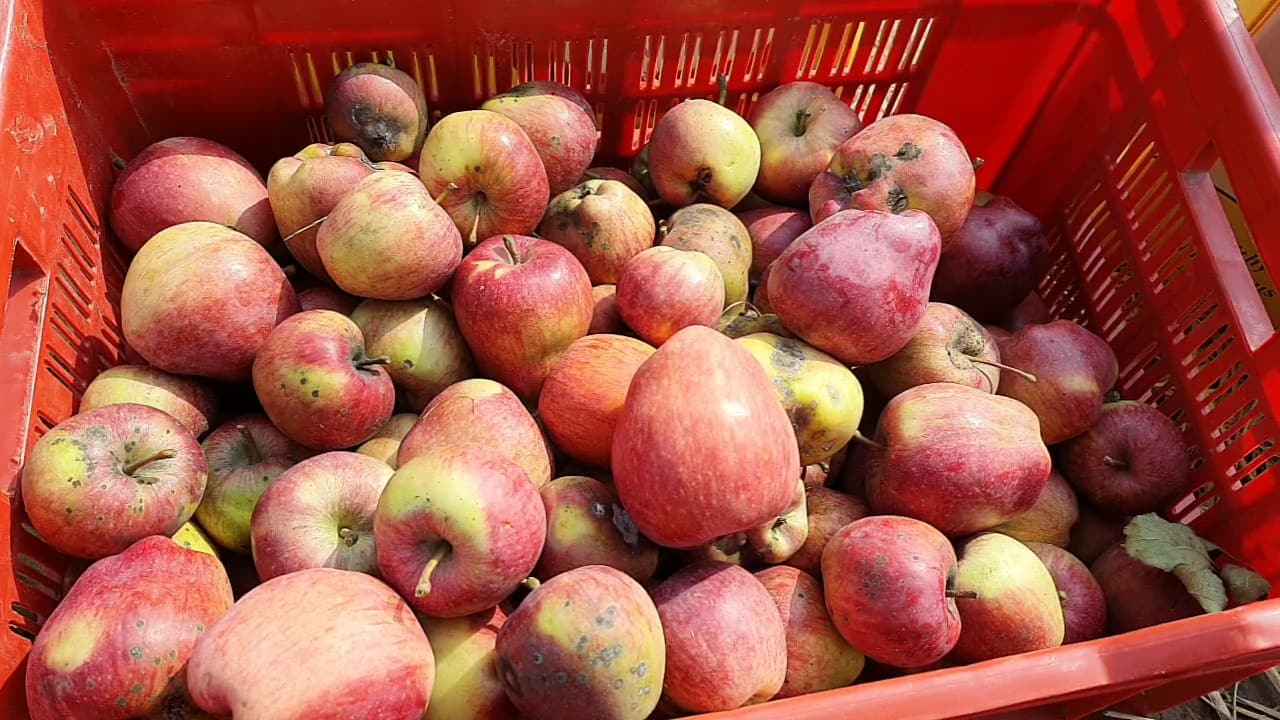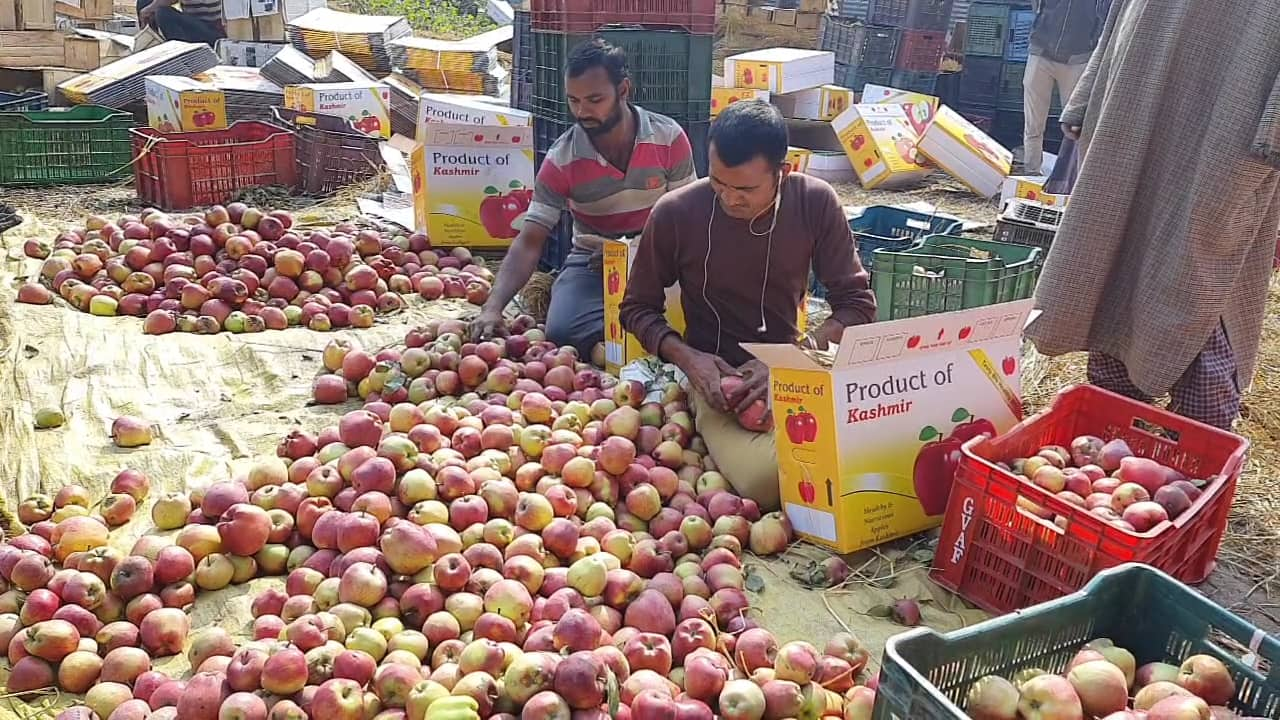



Shopian, October 29: Climate change, the exodus of non-native labourers during harvest season and the sale of fake pesticides were a huge blow to Kashmir’s apple industry this year.
Unseasonal snowfall in October especially spelled doom for the apples this year. In the Shopian and Kulgam districts of south Kashmir, orchardists reported how fruit-laden trees cracked under the weight of the snow and got uprooted. They saw trees they had nurtured over 15-20 years destroyed in a matter of hours. The fruit of the trees—including apple varieties like Chumboora, Maharaj, Delicious, Golden, Kulu and Kullu Delicious—were yet to be harvested.
The unseasonal snowfall has also caused discolouration of the apples that survived.
The main varieties of apples grown in Jammu and Kashmir are Razakwari, Hazratbali, Chumboora, Maharaji, American, Delicious and Ambri. Kashmir’s horticulture department had issued warnings about unseasonal snowfall; but these are cold comfort to the orchardists.
 Kashmiri apples. In an unexpected turn of events, the Taliban takeover of Afghanistan has reduced the import of Iranian apples which are similar in colour and texture but cheaper than Kashmiri apples. (Photo by Irfan Amin Malik)
Kashmiri apples. In an unexpected turn of events, the Taliban takeover of Afghanistan has reduced the import of Iranian apples which are similar in colour and texture but cheaper than Kashmiri apples. (Photo by Irfan Amin Malik)
Business losses
Bilal Ahmad Bhat, 38, an apple orchardist in Shopian, said: “Shopian, the apple bowl of Kashmir, is the coldest place in the Valley. Harvesting (usually) continues till November 15, when the crop would be in full bloom. But this year, right before the harvest, the snow (caused) damages worth nearly Rs3 crore (in his orchard),” said Bhat, who hails from Bongam, Shopian.
Bhat added that the trees damaged in his orchard were 30-40 years old and produced roughly 600 apple boxes every season. “The snowfall has damaged the crop in such a way that a box full of apples which would fetch us Rs1,000 earlier is now being sold at Rs100.”
Mohammad Ramzan Lone, a fruit dealer at the Sopore fruit mandi, around 50 km north of Srinagar, said rates vary based on the quality of the apples. For instance, he said the rate of A grade Delicious variety is between Rs500 and Rs1,200 per box. B grade Delicious apples are currently being sold for Rs200-500 in the mandi, and C grade apples fetch Rs50-150. A grade apples of the American variety go for Rs500-1,300 a box, B grade for Rs200-500 and C grade for Rs150-300.
On social media, a video clip of a sobbing farmer removing snow from his apple crop with his bare hands was doing the rounds in Kashmir. It drew attention to the destruction caused by climate change.
Bhat said that climate change caused damage to his orchard, leaving him mentally disturbed. “We took loans from the bank to invest in apple orchards but due to devastation of orchards, we won’t be able to repay our loans. Only a grower knows the pain of his damaged crop.”
 Apple growers say they were unable to act on the weather department's warning because there simply wasn't enough labour to harvest the crop in two days. (Photo by Irfan Amin Malik)
Apple growers say they were unable to act on the weather department's warning because there simply wasn't enough labour to harvest the crop in two days. (Photo by Irfan Amin Malik)
Labour woes
Of course, this is not the first time climate change has wreaked havoc in the apple orchards just before harvest. In 2018, apple growers in the Valley incurred losses of Rs 500 crore after untimely snowfall destroyed much of the crop.
Senior scientist at Sher-e-Kashmir University of Agricultural Sciences and Technology (SKAUST) Kashmir, Dr Amjad M. Hussaini, said that besides climate change, the apple industry is suffering due to poor harvesting methods, poor planning and marketing, and above all, the growers do not get remunerative prices for their crops.
Citing shortage of labour as a reason Bhat said that meteorological department’s snow forecast could not help the growers to pluck the crop. He blamed the recent killings of non-native workers for shortage of labourers in the Valley.
“The wet spell prediction from the weather department did not help growers. Due to unavailability of labourers, the plucking of crops two days before snowfall was impossible," Bhat said. "The shortage of labourers was the major reason why timely harvesting did not happen. Earlier, we used to get a labourer for Rs600 per day but now the rates have skyrocketed to Rs1,600 per day.”
Militants in the peak of harvesting season killed 11 civilians, particularly of those from outside Kashmir. The killings of non-locals created a climate of fear in Kashmir, forcing migrant labourers to leave the Valley.
 According to the Department of Horticulture in Kashmir, seven lakh families in J&K depend on the horticulture sector directly or indirectly. (Photo by Irfan Amin Malik)
According to the Department of Horticulture in Kashmir, seven lakh families in J&K depend on the horticulture sector directly or indirectly. (Photo by Irfan Amin Malik)
Fake pesticides and knowledge gaps
This year, orchardists also blamed fake pesticides for the reduced production. Inside the orchards of Sirhama, Waghama and Marhama in south Kashmir’s Anantnag district, apple growers lamented that substandard pesticides spoiled almost 70 per cent of apples.
Sajad Ahmad Nanwai, 34, estimated that production on his orchard in Marhama was 60-70 per cent lower this season compared with previous years. Nanwai, who has been doing apple farming for seven years, blamed the use of spurious pesticides for this. "The production was not just low but the quality of apples was also not up to the mark,” he said.
Over the past few years, the outbreak of diseases like red mite, scab and San Jose scale has also affected apple production. Growers said that as a result, they had to sell their apples as C grade rather than A grade.
In north Kashmir’s Sopore, the apple town of Kashmir, 29-year-old orchardist Dr Mohammad Ashraf Mir told Moneycontrol that this year the crop yield on his land was 50 per cent less than previous years.
Hailing from Peth Seer, a village surrounded by apple orchards, Mir blamed the outbreak of diseases for the low yield. “The crop depletion can be seen north to south. This year, the crop spoiled at initial stage only and the pesticides and spray did not help much.”
Dr Zahoor Ahmad Bhat', senior scientist at the Ambri Apple Research Centre - SKUAST, Shopian, told Moneycontrol that apples are highly dependent on bee pollination. However, the majority of farmers in the Valley do not have any idea about pollination, pollinators and pollinizers. “Inadequate pollination not only reduces apple yield by causing poor fruit set, it also increases premature fruit drop and leads to poor fruit quality. We have been recommending growers to place 4-5 bee hives in their orchards,” Bhat said.
 Kashmiri apples (2020 Photo via Wikimedia Commons 4.0)
Kashmiri apples (2020 Photo via Wikimedia Commons 4.0)
Iranian apples
The four-month lockdown following the abrogation of Article 370, the special status of the region, in August 2019, and the Covid-19 pandemic also came as setbacks to the industry. Amid all this, a new threat surfaced to the industry in the form of Iranian apples.
The apple growers are grappling with the infiltration of Iranian apples as the colour and texture of the Iranian apples closely resembles the Kashmiri apple.
Bhat said that ever since Iranian apple varieties have entered markets in India, including the Azadpur Mandi in Delhi, the rates of Kashmiri apples have drastically fallen. “We are worried about losing market share to the imported apple. Like with every other country, these apples should be properly valued and taxed by the government so that local growers do not face huge competition in the market.”
Over the years the Iranian apples have come via Afghanistan under the South Asian Free Trade Agreement (SAFTA) at zero per cent import duty - this has been affecting the market for Kashmiri apples. The influx of cheaper Iranian apples (locally referred to as Iranian) has hit the horticulture sector in Kashmir. But this year, due to the Taliban's takeover in Afghanistan, imports have fallen.
The horticulture sector, as per the Jammu & Kashmir government, is a key employment generation sector and backbone of the region’s economy with an annual turnover of Rs1,200 crore. The sector also provides direct and indirect employment to nearly 23 lakh people, according to the department.
The Department of Horticulture Kashmir estimated that around 7 lakh families and 35 lakh people are directly or indirectly dependent on horticulture, contributing about 7 per cent to the union territory’s gross domestic product (GDP). The 2017 J&K Economic Survey showed that more than 50 per cent of Kashmir’s population is dependent on horticulture, and apple orchards occupy half of the land under horticulture cultivation.
Government figures also show that 3.38 lakh hectares of land in Kashmir is under the fruit cultivation. Of which 1.62 lakh hectares is under apple cultivation. The region has more area under apple cultivation than the United States, the world’s second-largest producer.
Discover the latest Business News, Sensex, and Nifty updates. Obtain Personal Finance insights, tax queries, and expert opinions on Moneycontrol or download the Moneycontrol App to stay updated!